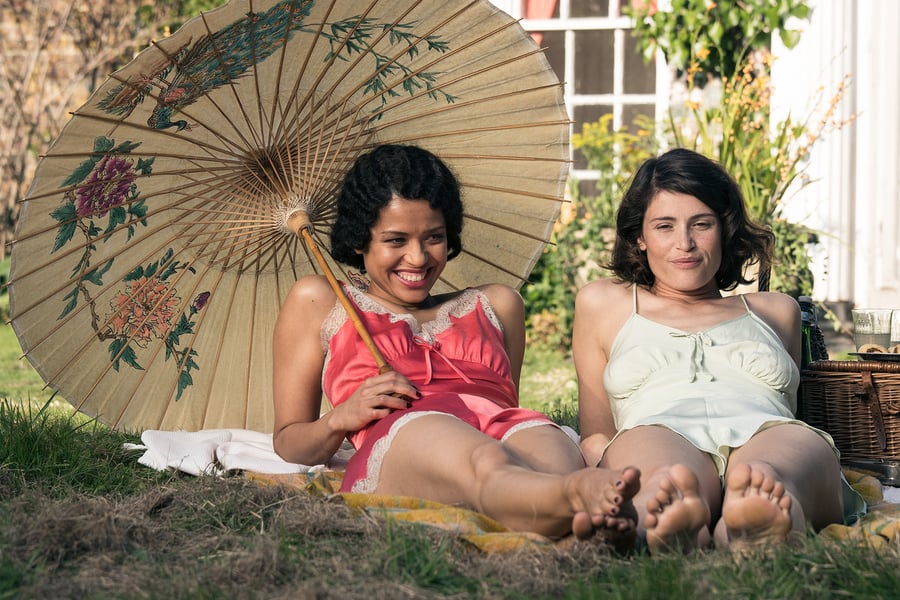In a cozy, seaside cottage in Kent, with the winds of WWII still at a distance, Alice Bloom (Gemma Arterton) bangs out academic theses about folklore on her typewriter and launches verbal attacks on neighbors who dare to interrupt her work. The locals have the swaggering, chainsmoking Alice pegged as a witch who’s probably signaling the Nazis from her perch over the white cliffs. The Brit villagers are not even half right — but oh, does she have anger to spare. Her reveries concern a torrid affair with Vera ((Gugu Mbatha-Raw), the writer who left Alice to get married and fulfill a dream of having a family. These are not times when the world would be forgiving of a mixed-race lesbian affair. Nonetheless, Alice feels bitter and betrayed. In a flash-forward to 1975, we see the aged Alice, now played by the great Penelope Wilton, typing away and telling the heckling brats who come to her door to “bugger off!”
That’s the setup for Summerland, a sweet, soft-centered pastoral drama that’s never as tough-minded as you want it to be. Thankfully, in her feature debut as a filmmaker, playwright Jessica Swale shows a genuine flair with actors. She had previously directed Arterton and Mbatha-Raw on the London stage, where they alternated the title role in Nell Gwynn, about the Restoration actress who became the mistress of King Charles II. Each revealed a fire inside that has few chances to ignite here, however. Arterton, a fierce presence in such films as The Disappearance of Alice Creed, The Escape and Vita and Virginia, brings a human dimension to the curmudgeonly Alice that’s not in the script. Mbatha-Raw (Belle, Beyond the Lights, Motherless Brooklyn) is equally luminous as Vera, though the role is underwritten and given scant screen time. Their scenes together lack the erotic wattage and emotional intensity to become the film’s defining focus.
That responsibility falls to Alice’s relationship with Frank (Lucas Bond), a schoolboy who is literally dropped on her doorstep. Frank’s parents, a bomber pilot and a worker for the war effort, have temporarily (they hope) evacuated their son to Kent to save him from the German bombs falling over London. Unbeknownst to her, Alice has been chosen to shelter the boy for the duration. She’s horrified, of course. So is Frank. Alice gives him permission to stay a week until other arrangements can be made. Is that enough time for this frightened, lonely, adorable child to melt her cold, cold heart? Have you ever seen one of those vintage afterschool TV specials, which Summerland closely resembles?
Luckily, Arterton and Bond have the talent, charm and cunning to (almost) sell this hackneyed plot line. She teaches him about her work and Summerland, the pagan version of heaven she’s writing about. “Everyone wants magic or a God or something,” Alice instructs while revealing the scientific reasons why castles seem to rise out of thin air in a kind of Fata Morgana mirage.
Cinematographer Laurie Rose knows all too well how to paint pretty pictures with her camera, which creates a crying need for a touch of sass. The acerbic twist comes from Edie (a terrific Dixie Egerickx), a fellow student at the school run by a benign headmaster (Tom Courtenay, doing very much with very little). Edie calls herself a “maverick” and an “individualist.” She issues an unreliable warning to Frank that Alice is a sadist who will “burn you and do sex things to you.”
Not in this movie! Alice and Frank are more prone to chat about their circumstances. “I’m sorry,” she says, “but life is not kind. Anguish is inevitable. It’s how you deal with it that counts.” Frank deals with these big issues by asking questions, such as why Alice doesn’t have a husband. “Would you think it strange if a woman loved another woman?” she asks. Frank’s quick acceptance of the notion, hardly true to the mores of the era, leaves her blissful. “Did you kiss her on the lips?” he wonders. “Mostly,” says Alice, in a line so laced with innuendo it seems to come from another movie.
Summerland, available on demand and in select theaters on July 31st, promises way more than it delivers. And by the time it reaches a so-called shocker ending that stretches a suspension of disbelief beyond the breaking point, you’re likely to feel too manipulated to care. But why kick too hard at a harmless fluffball with its heart in the right place? In these pandemic times, you could do worse than indulging in the cinematic equivalent of comfort food.
Love Music?
Get your daily dose of everything happening in Australian/New Zealand music and globally.
From Rolling Stone US



































